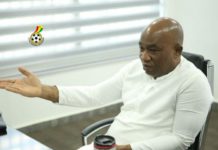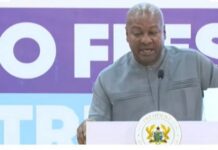
The Speaker of Parliament, Prof. Aaron Michael Oquaye on 4th June, 2019 ruled that, the Member of Parliament for Bawku Central, Mahama Ayariga, be released while the House was sitting to appear before the High Court (Financial Court) to commence the arraignment proceedings against him.
The Speaker, in his ruling relied on Articles 117, 118(1) and 122 of the 1992 Constitution and Standing Orders 5 and 98 which provide for privileges and immunities for the Speaker, Members of Parliament and the Clerk to Parliament.
He stated that while these immunities and privileges are not meant to place a Member above the law, they are to prevent any obstructions that will impede the proceedings of Parliament.
The Speaker charged the Court to follow the norm of scheduling court sittings to accommodate the Legislative calendar so as to prevent any impediments on proceedings in Parliament.
He concluded that, the combined effect of the provisions on the privileges and immunities is to ensure the smooth administration of the Arms of Government of the Republic.
Below is the Speaker’s detailed ruling on the matter.
RULING ON THE APPLICATION OF THE HON. MAHAMA AYARIGA ON HIS INVITATION BY A LETTER FROM THE SPECIAL PROSECUTOR TO APPEAR BEFORE THE HIGH COURT TODAY TUESDAY THE 4TH OF JUNE, 2019 at 9 am.
Hon. Members, this ruling is made following the issue of privilege raised by Hon. Mahama Ayariga on the receipt of a letter from the Special Prosecutor of the Republic requesting the Speaker to release Hon. Ayariga to appear before a criminal court today Tuesday the 4th of June, 2019. The Hon. Ayariga has indicated he sent his lawyers to Court to represent him and indicate that his partial immunity will not allow him to attend court when Parliament is sitting.
The Hon. further indicated that out of respect and to avoid a battle between the legislature and other organs of State, he would attend the Court at 1 pm and bring his side of the immunity before the court. The Hon. referred to our Constitution and respectfully I echo the following:
a. Article 117 which reads “Civil and criminal processes coming from any court or place out of Parliament shall not be served on, or executed in relation to, the Speaker or a member or the Clerk to Parliament while he is on his way to, attending at or returning from, any proceedings of Parliament.”
b. Article 118(1) which reads “Neither the Speaker nor a member of, nor the Clerk to Parliament shall be compelled, while attending Parliament to appear as a witness in any court or place out of Parliament.”
c. Article 122 which reads “An act or omission which obstructs or impedes Parliament in the performance of its functions or which obstructs or impedes a member or officer of Parliament in the discharge of his duties, or affronts the dignity of Parliament or which tends either directly or indirectly to produce that result, is contempt of Parliament.”
Our Constitution provides that no person is above the law. Indeed, the Hon. Members of Parliament are not above the law. Luckily, it is obvious that members are mindful of this and no person should canvass this point which is rather spurious. Nevertheless, the Constitution gives certain limited immunity to MPs and it is for good reason. Any invitation that would obstruct a sitting MP is not acceptable by our 1992 Constitution. All law-abiding citizens must respect this as a provision of the highest law of the Land.
Notably, the provisions allow space to try an MP. This is where practicality comes in. In the case of Hon. Dan Abodakpi, the Court hearings were held on Mondays and recess periods of Parliament. This allows for trial to go on and also satisfy the Constitutional provisions. Court sittings can even be held from day to day during vacation and with a particular case being heard exclusively by the Judge to expedite trial and also fulfil the Constitutional requirement. Students of the Rule of Law, Separation of Powers and Constitutionalism will appreciate this position.
During the First Republic of Ghana, the PDA was applied to detain opposition MPs, only for them to be absent from the House for 14 days and then dismissed from Parliament. This is dangerous for human rights and democracy as this can be employed by criminal charges and trials which will prevent the people’s representatives from representing them.
Our Constitutional injunction against cross-carpeting is also to protect representative government. The price for liberty is eternal vigilance. If 20 opposition MPS at any time should be put before Court by a regime which aims at destroying representative governance, what should we do? This is not the day for visionaries to start protesting.
Suppose trials are over the place, Bawku, Tumu, Enchi, Aflao etc, can Parliament function? What if arraignments before courts are timed just before crucial votes in the House?
The History of these privileges must be studied by lovers of freedom. In England, at one stage, the Crown did all it could to inhibit Parliament with arrests etc. Hence the need for protection which evolved till we have captured it in our Constitution. We need sober reflection of these matters. Our Constitution allows for a possibility that some day a President’s party would be in the minority. Should we allow him to use certain tactics to cripple the majority through trials?
Hon. Members, the Constitutional document that we the people of Ghana gave ourselves in 1992, contemplates that the exercise of political authority will function in a way that limits Government and secures liberty. An important cog in the proper functioning of that mechanism is the aspiration of our founders that the three co-equal branches of Government will work independently. As noted by the late learned Chief Justice Wiredu: “The scope and extent of the doctrine of the separation of powers…under the Constitution, 1992 is to ensure that each arm of state in the performance of its duties within the framework of the Constitution, 1992 …act[s] independently and should not be obstructed in the exercise of its legitimate duties or be unduly interfered with”. It is therefore of critical importance that in the dealings of arms of government and other State actors, care is taken to ensure that legitimate duties are not interfered with or obstructed. The Constitution must at all times be the guiding light.
As Hon. Members are aware, our laws provide that civil and criminal processes coming from any court or place out of Parliament shall not be served on, or executed in relation to, the Speaker or Member or Clerk to Parliament while he is on his way to, attending at, or returning from, any proceedings of Parliament.
As I understand it, and as our Courts will not tarry to agree, the purpose of this Constitutional provision is to ensure that the legitimate business of Parliament is not disrupted. These privileges and immunities ensure that any agency exercising some form of the executive power does not use these powers to stultify, obstruct and in any manner act to affect the lawful exercise of Parliamentary duty by Parliament as a whole or by its individual members. Parliamentary privileges and immunities are considered essential for Parliament, as an institution, and its Members, as representatives of the people, to fulfil their functions. They do not exist for the personal benefit of the Speaker, Members or Clerks. The object of Parliamentary privileges and immunities is to safeguard the freedom, the authority and the dignity of Parliament.
The privileges and immunities were never intended to place Members of this House above the very laws our democracy mandates us to make; neither were they intended to secure an absolute immunity for members in a way that is reminiscent of the dealings of despots and dictators.
I am reminded particularly of the words of the late Justice of the Supreme Court, Amua-Sekyi, J.S.C. who said with an eloquence of which he was known, that:
“The medieval fiction that the ‘king can do no wrong’, which the sophist interpreted to mean that if the action was wrong, then it was not that of the king, has no place in a republican setting which prides itself on all citizens being equal under the law and therefore obliged to act in conformity with it.”.
Hon. Members, in any event, the House does not sit all year round, neither does it undertake its activities all year round. Similarly, Members are not perpetually on “their way to, attending at, or returning from, any proceedings of Parliament.” There are periods of recess and there are periods within a week when the House does not sit or work in Committees. A process from a court or a place may be served on that member during those periods, or during times which does not offend Article 117. Also, as has been the practice, the Courts noting the Constitutional injunction have been minded to schedule court sittings to accommodate the legislative calendar so as to “ensure the smooth administration of the judicial, legislative or executive governance of the State”. It is my prayer that any agency desirous of serving civil and criminal processes on the Speaker or any Member or Clerk to Parliament remains mindful of what these relevant Articles say and the gloss that time-tested practices have conferred on Parliament. Hon. Members, to do this in any other way breaches the 1992 Constitution.
Hon. Ayariga has agreed to appear before the Court by 1 pm. He is hereby accordingly released today. I trust that reasonable arrangement will be made to try him (as he is surely not above the law). But in a manner which will enable him to represent the good people of Bawku Central. In the interim as he is presumed innocent also by operation of the law till proven guilty. I trust the Court will also act accordingly.
This is my considered ruling on this matter raised by the Hon. Ayariga.
Source: Daily Graphic






